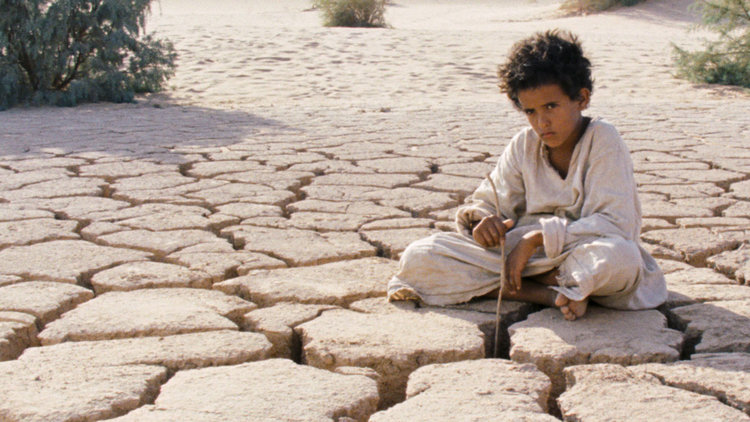Theeb (2014)
Director: Naji Abu Nowar
Writers: Naji Abu Nowar, Bassel Ghandour
Actors: Jacir Eid Al-Hwietat, Hassan Mutlag Al-Maraiyeh
من يغوص البحر الأحمر، فلا يلحق مداه
He who swims in the Red Sea cannot know it's true depth
و البحر يا ذيب، ما كل رجل يا صله
And not just any man Theeb, can reach the seabed my son
و الخوي لا من بدالك، لا تخيب له رجاه
In questions of brotherhood, never refuse a guest
كون يمه في يمينه، بالمراجل واصله
Be the right hand of the right when men make their stand
و الذيابة لو بدت، ما تحققلك نجاة
And if the wolves offer friendship, do not count on success
كلهم ما ينفعونك ، و المنايا حاصلة
They will not stand beside you when you are facing death
The poem at the beginning of the film holds such importance when it comes to the themes of the film. We notice that throughout the film, Theeb will go through the verses of the poem. What Theeb does to the challenges he faces is what the audience are curious about. This is the first time watching a Jordanian film. I have seen my fair share of Arabic films, but never something serious or passionate such as Theeb. I am glad I watched this film because of the complexity it holds within. Just as the poem says, it applies to this film, "He who swims the Red Sea cannot know it's true depth. And not just any man Theeb, can reach the seabed my son".
In my opinion, Theeb's greatest strength is its hidden themes and messages. The film is riddled with themes of culture, manhood, and survival. We see a lot of instances where traditional Jordanian culture is shown to trump even logic at times. When a guest comes, they kill one of their goats in order to feed them. The brothers take the guests on this very difficult trail. Similar to the poem which says "never refuse a guest". Similarly we see the guest fighting the Englishman because of the dangers that he would put the brothers in. Even though this journey is important to them, he cannot risk the lives of the two Bedouin brothers who gracefully offered to help. Other than that we see a great emphasis on manhood, and what it takes to become a man in these areas. Theeb, generally oblivious of the dangers of the world, follows his brother on this journey. Thus he gets flung into a dangerous situation that he will not be able to overcome unless he changes within himself. The final scene represents the final transformation of Theeb. From a pup into a wolf (Theeb meaning wolf in Arabic works well with this idea). The pulling of the trigger meant that Theeb did not cower to the stranger anymore and took fate into his own hands by avenging his brother. From my personal experience the story is not what brought the whole film together. The story is simple, and only meant as a vessel for the experience. The aspects that actually brought the film together were the themes. That is why the poem was given to us at the very start. To understand what the film wants to talk about and discuss.
Along with the themes, the film managed to show a lot of positive aspects when it comes to the technical side. The cinematography first of all really impressed me. Making a desert look nice is tough already, but trying to make it look good for 1 hour and 40 minutes is an achievement. The director really managed to capture the feeling of being in a desert. The feeling of loneliness and being stranded. Throughout the film, the director did not compromise with giving us interesting shots. It never felt dull to look at, even though it was all filmed in an empty desert. Constant changing of shots and perspectives helped elevate the cinematography to something that can be enjoyed and not just looked over. Furthermore, the soundtrack played a key role in the success of the film as well. The traditional Jordanian music really added a degree of tension that the film desperately needed. Had they used Hollywood style music, I believe the film would not have been as effective in building up the needed tension.
Finally I want to talk about the acting, especially of Theeb. Although he barely spoke much throughout the film, Theeb managed to carry the film with his performance. Simple gestures such as the looks of confusion he gives to the Englishman felt so genuine. As if the actor is in fact this Bedouin kid in the deserts of Jordan. Flies come all over his face and he does not even bat an eyelash. It all feels natural and it is why the film was so effective in telling the story of Theeb. Hopefully we see more of this actor in the future, and if not, at least we got to witness this performance.
All in all, Theeb is a great film to get you into the world of Arabic cinema. It shows many of the traditional cultural aspects that Arabs during the time and still to this day hold dearly. Although the film suffers some pacing issues, especially during the second half, it manages to overcome that with great cinematography and a gripping soundtrack. Furthermore, the acting of Jacir Eid Al-Hwietat along with the themes of the film bring the film together neatly and presents one of the great modern Arabic films in a long time. Do not miss this one.



